Key takeaways:
- Stress management techniques can include physical, mental, and emotional strategies, with journaling serving as a powerful tool for clarity and emotional awareness.
- Establishing a consistent journaling routine, whether in the morning or before bed, can enhance reflection and reduce stress.
- Emphasizing the importance of intention in journaling helps focus on personal growth and fulfillment over time.
- Embracing imperfection in writing allows for authentic self-expression and the discovery of patterns in emotions and stress over time.
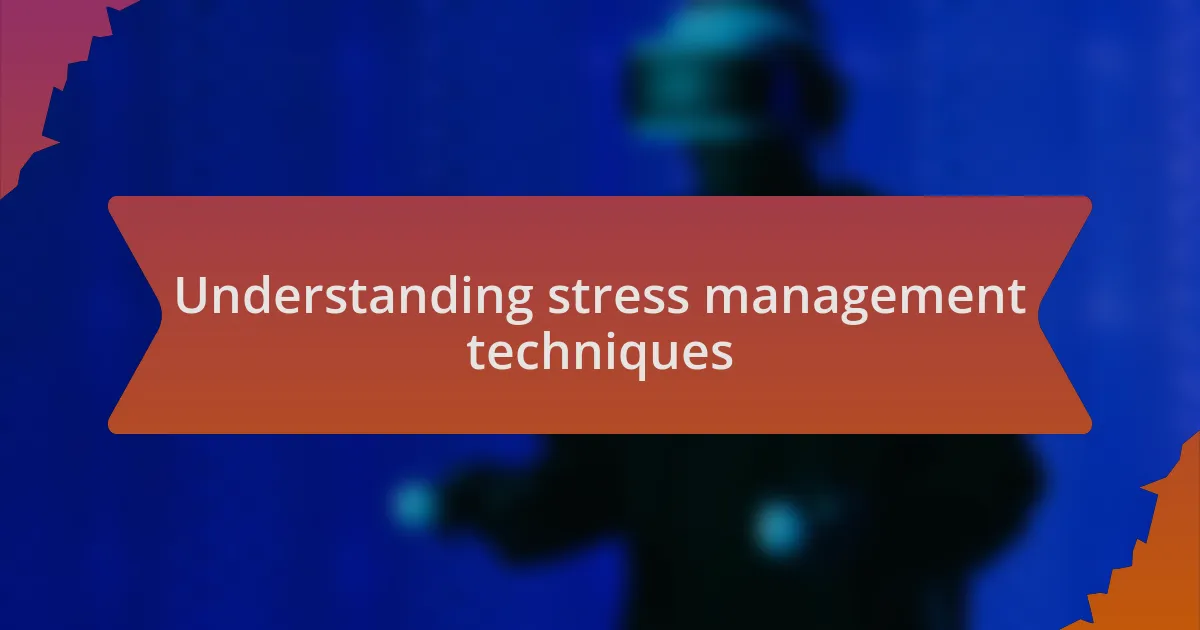
Understanding stress management techniques
Stress management techniques can vary widely, but they generally fall into a few key categories: physical, mental, and emotional strategies. For me, finding the right approach took some trial and error. Have you ever tried a method that didn’t quite resonate? It’s common to feel that way, and it often leads us to discover what truly works for ourselves.
I remember a particularly hectic week when work and personal obligations collided, leaving me overwhelmed. Sitting down to journal allowed me to pause, reflect, and release my thoughts onto the page. It was as if the act of writing transformed my chaos into clarity, a gentle reminder that sometimes slowing down can be incredibly powerful.
Furthermore, incorporating mindfulness techniques like deep breathing or meditation can complement journaling beautifully. I’ve practiced these alongside my writing sessions, and they deepen my focus and calm my racing mind. Have you ever noticed how just a few minutes of focused breathing can change your perspective? It’s fascinating how these techniques can lead to a greater sense of control over stress.
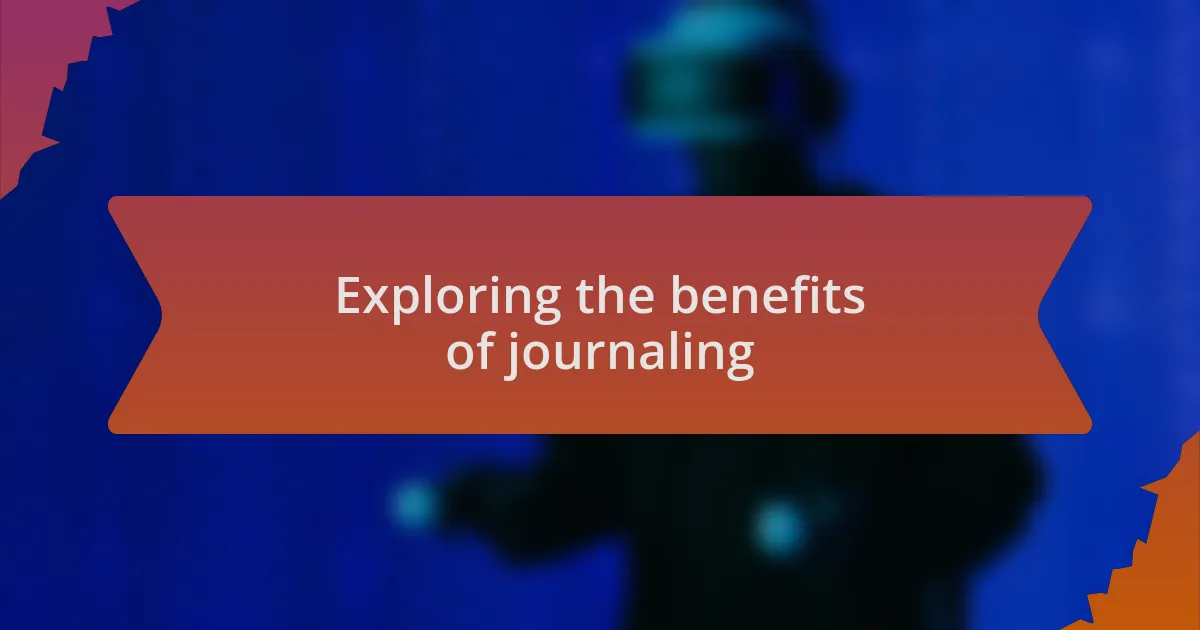
Exploring the benefits of journaling
Journaling offers a unique outlet for self-expression, allowing thoughts and feelings to flow freely onto the page. When I first started, I was surprised how liberating it felt to write down my worries. It was as if I was releasing a weight I didn’t even know I was carrying. Have you ever noticed how sometimes just vocalizing a problem can make it feel smaller?
The practice of journaling also enhances emotional awareness. For instance, I often find myself reflecting on my day, identifying triggers associated with my stress. This reflection not only helps me understand my emotions better but also equips me with the tools to handle similar situations in the future. How often do we pause long enough to uncover the root of our worries?
Moreover, I’ve discovered that journaling fosters gratitude and positive thinking. By jotting down things I’m thankful for, I shift my perspective from what’s troubling me to what uplifts me. I remember a period when I focused on gratitude journaling every morning, and it profoundly affected my mindset. How can such a simple practice make such a difference? It’s a testament to the power of shifting our focus and cultivating a more positive outlook on life.
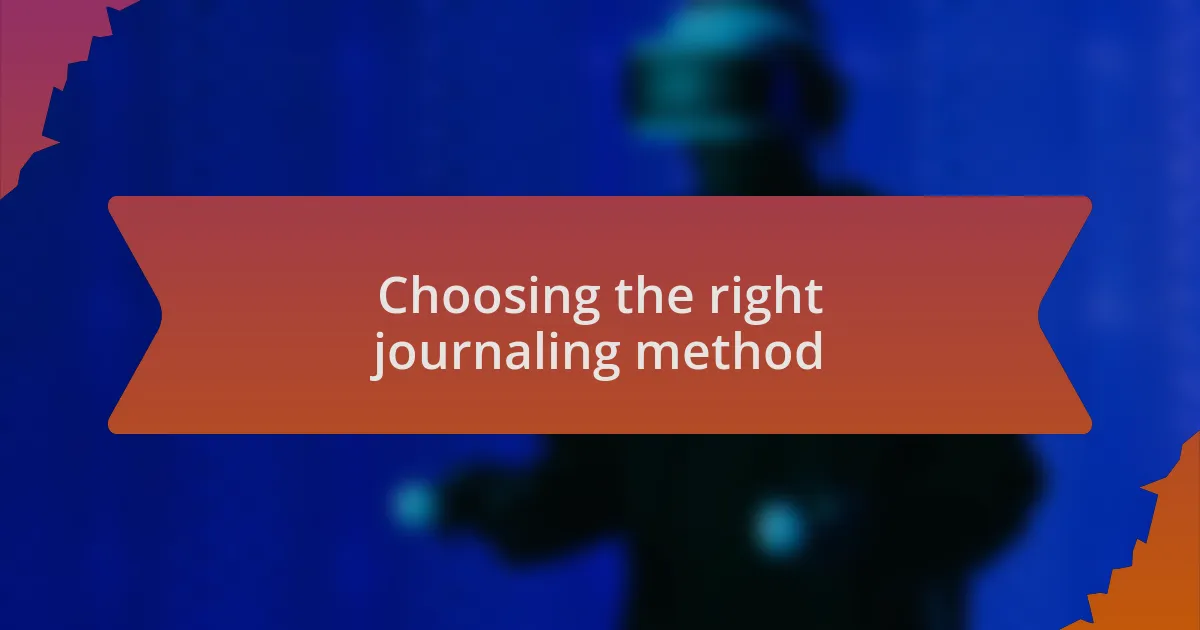
Choosing the right journaling method
When it comes to choosing the right journaling method, it’s essential to consider how you prefer to express yourself. I’ve experimented with various styles, from free writing to structured prompts. I found that a blended approach works best for me—starting with freeform thoughts to warm up and then switching to prompts that challenge my reflection. What about you? Have you identified a method that feels natural to your writing style?
Digital journaling has become increasingly popular. I still recall my first experience with a journaling app, which transformed my habit—no more carrying around a notebook. The ease of typing on my phone allowed me to capture moments of stress or joy in real time. But have you thought about whether a digital or analog approach suits your needs? Each medium has its benefits, and discovering which speaks to you can enhance your journaling experience significantly.
Intention is another pivotal factor in selecting a journaling method. Initially, I approached journaling with a mindset focused solely on stress relief. Over time, I realized that setting intentions—for instance, wanting to explore creativity or personal growth—made my entries deeply more fulfilling. What are you hoping to achieve with your journaling practice? Prioritizing your goals can lead you to the technique that resonates with your journey most authentically.
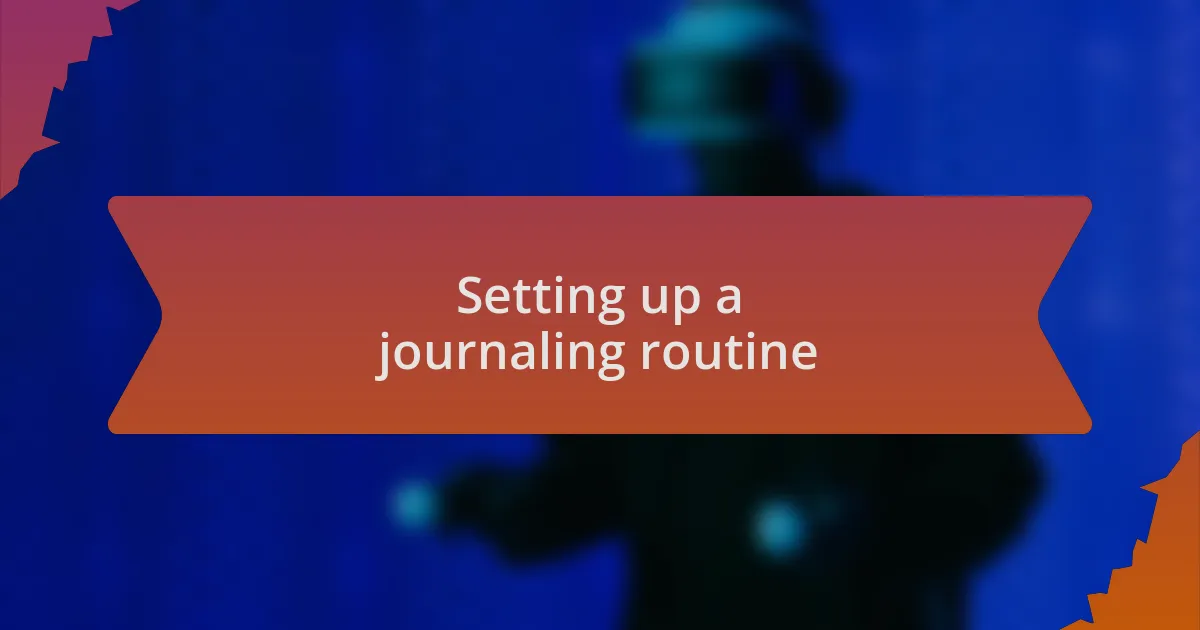
Setting up a journaling routine
Establishing a journaling routine hinges on consistency, which I found to be a game changer. I made it a point to jot down my thoughts every morning, even if it was just for five minutes. Have you ever noticed how a simple morning ritual can set the tone for your entire day?
Finding the right time is equally crucial. I stumbled upon the serenity of journaling right before bed, allowing me to reflect on the day’s events and unload any lingering stress. This wind-down ritual not only provided clarity but also prepared my mind for restful sleep. Have you experimented with different times to see what feels best for you?
Additionally, creating a conducive environment can enhance your journaling experience. One evening, I rearranged my workspace, adding soft lighting and a comfortable chair. That small change made writing feel less like a chore and more like a nurturing escape. What adjustments can you make in your surroundings to foster a more inviting journaling space?
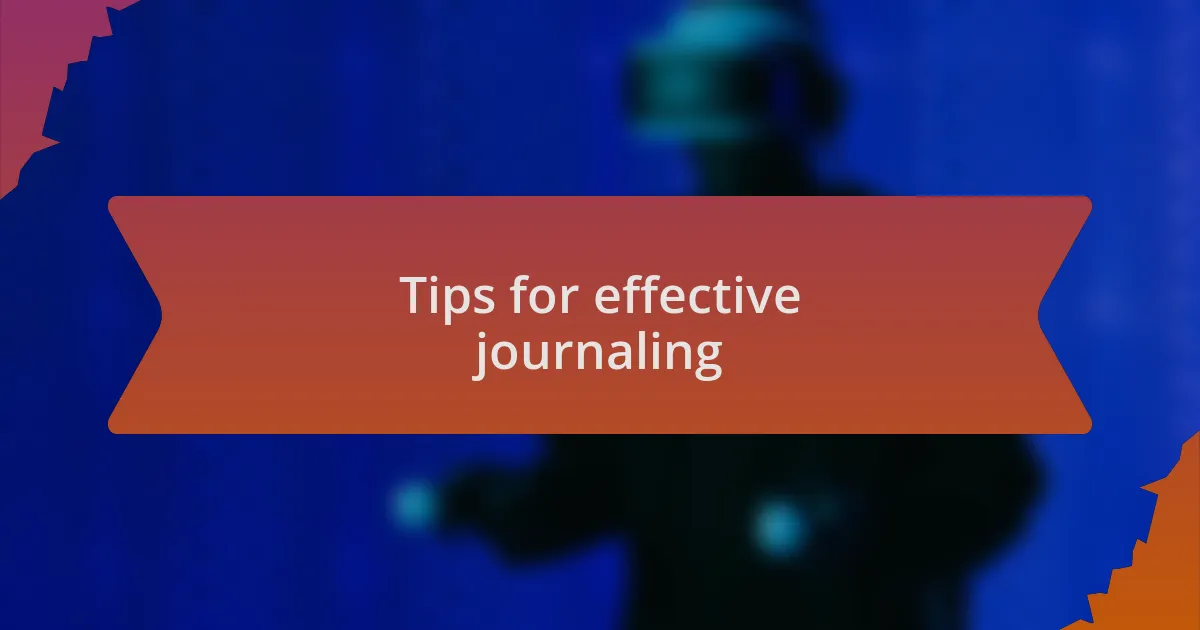
Tips for effective journaling
To make your journaling more effective, consider setting specific themes or prompts for each session. I often find that when I focus on a particular topic, like gratitude or challenges, my writing flows more freely and becomes more meaningful. Have you ever tried writing down your goals for the week? It can be a powerful way to clarify your intentions.
Another tip I discovered is to embrace imperfection in your writing. Early on, I worried about grammar and neatness, but I realized that my journal is a personal space, not a polished essay. Letting go of that worry allowed me to express my thoughts authentically. Have you ever felt liberated by just letting your thoughts spill onto the page without judgment?
Lastly, timeline your entries to track progress and changes over time. I started noting down my feelings at the end of each month, and it amazed me to see how my thoughts evolved. This reflection helped me identify patterns in my stress and joy. What insights might you uncover by looking back at your own entries?
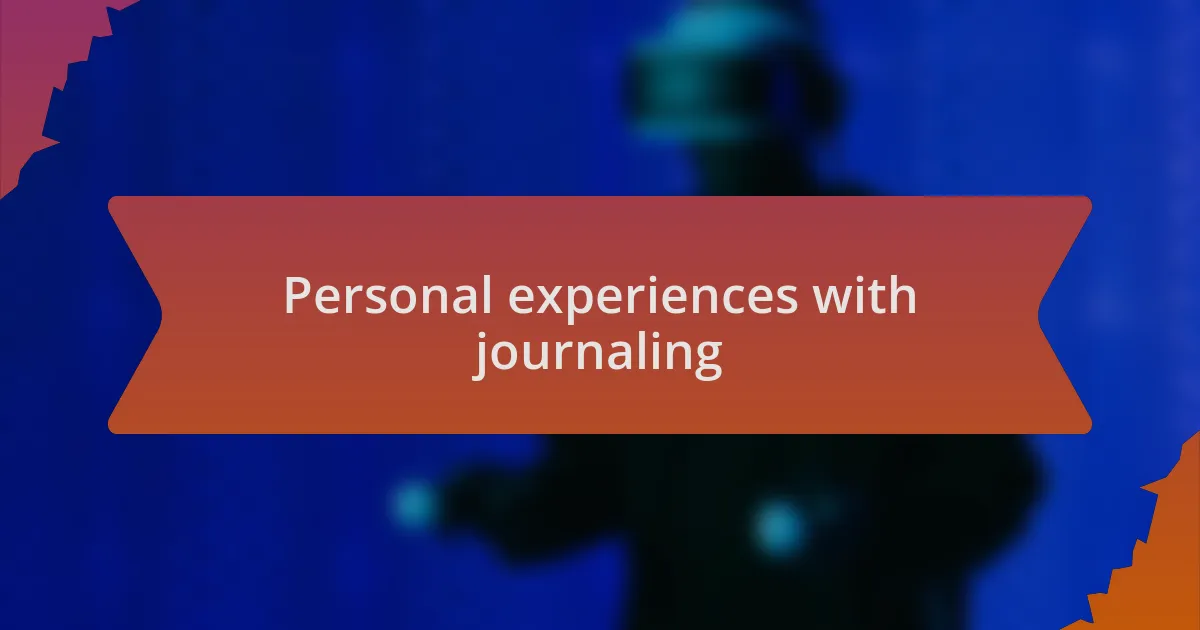
Personal experiences with journaling
I remember the first time I picked up my journal in a particularly stressful moment. I was overwhelmed with deadlines and personal commitments. As I wrote, it felt as though I was unburdening my thoughts, allowing the chaos in my mind to spill onto the pages. Have you ever experienced that moment when writing just clicks and suddenly, clarity emerges amidst the turmoil?
There were nights when I would write before bed, seeking an escape from the day’s anxious thoughts. In those quiet moments, I often found solace in recounting the small joys I encountered, like a stranger’s smile or a warm cup of tea. It’s fascinating how such simple reflections can shift your perspective and cultivate gratitude. Have you tried taking a similar approach in your journaling?
One particularly striking entry came after a tough week of juggling myriad responsibilities. I wrote about how each stressor felt like an anchor pulling me down, and yet, by chronicling those feelings, I discovered a sense of control. Transforming chaos into written words became a form of empowerment. I realized that what seems overwhelming in thought can be tamed through the act of journaling. How might your own words help you navigate your challenges?